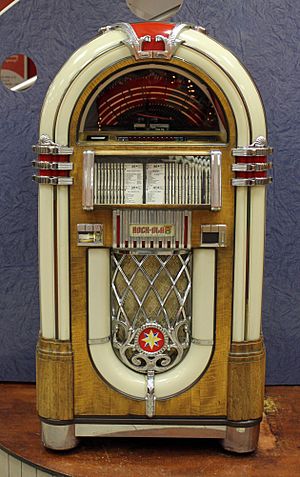Jukebox facts for kids
A jukebox is a cool musical machine that lets you pick and play your favorite songs! These special devices are partly automatic and usually work when you put a coin in them. Imagine a big, colorful box filled with music, ready to play whatever tune you choose.
The word jukebox became popular around 1940, but machines like them had been around for a while before that. They were once super popular places to listen to music, especially in diners and cafes. However, over time, jukeboxes have become less common. Today, people mostly use digital audio players or Internet music services to listen to their tunes.
Contents
What is a Jukebox?
Jukeboxes are like giant music players that hold many songs. They let you select a specific song from a list, usually by pressing buttons or turning a dial. Once you choose, the machine finds the song and plays it for everyone to hear.
How Jukeboxes Work
Early jukeboxes played phonograph records. When you put in a coin and made a selection, a robotic arm would pick up the chosen record. It would then place the record on a turntable to play the song. After the song finished, the arm would carefully put the record back in its spot.
Later jukeboxes used compact discs (CDs) instead of records. Modern ones might even store music digitally, like on a computer. This makes them much smaller and able to hold thousands of songs.
A Brief History of Jukeboxes
The idea of a coin-operated music machine started way back in the late 1800s. These early machines were called "nickel-in-the-slot" phonographs. They were often found in public places like saloons and arcades.
From Phonographs to Jukeboxes
In the 1920s and 1930s, these machines became more advanced. They could hold more records and had better sound quality. Companies like Wurlitzer, Seeburg, and Rock-Ola started making these machines. They often had fancy designs with colorful lights and shiny chrome.
The term "jukebox" likely came from "juke joints," which were informal places where people danced and listened to music. By the 1940s, jukeboxes were a huge part of American culture. They were everywhere, from diners to dance halls, playing the latest hits.
Why Jukeboxes Were So Popular
Jukeboxes were a big deal because they made music accessible to everyone. Before home record players were common, jukeboxes were often the only way to hear new songs outside of a radio.
Social Hubs and Music Trends
They became central to social gatherings. Friends would gather around a jukebox, pick songs, and dance. Jukeboxes also helped new music genres, like rock and roll, become popular. If a song was a hit on the jukebox, it often became a hit everywhere else too.
They were especially important for teenagers. Jukeboxes in soda shops and diners were cool places to hang out. They allowed young people to listen to their own music, separate from what their parents might play at home.
The Decline of Jukeboxes
By the late 20th century, jukeboxes started to lose their popularity. Several things led to their decline.
New Technology Takes Over
The biggest reason was the rise of new music technologies. Home stereo systems became more affordable, allowing people to play their own records or tapes whenever they wanted. Then came compact cassettes, followed by CDs, and eventually digital audio players like the iPod.
The Internet and online music streaming services delivered millions of songs directly to people's phones and computers. This made the idea of going to a specific machine to play one song seem old-fashioned.
Jukeboxes Today
Even though they are not as common, jukeboxes haven't completely disappeared. Many people still love them for their classic style and the nostalgia they bring.
Collecting and Retro Appeal
Old jukeboxes are now often collector's items. People restore them and keep them in their homes as cool pieces of furniture. Some modern bars and restaurants still have jukeboxes, sometimes updated with digital music, to give a retro feel.
Jukeboxes remind us of a time when music was shared in a different way. They are a fun part of music history that continues to charm people of all ages.
Images for kids
See also
 In Spanish: Jukebox para niños
In Spanish: Jukebox para niños
 | Jackie Robinson |
 | Jack Johnson |
 | Althea Gibson |
 | Arthur Ashe |
 | Muhammad Ali |




